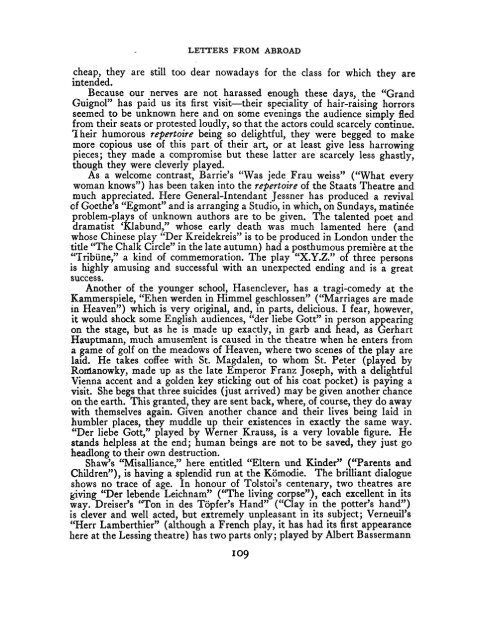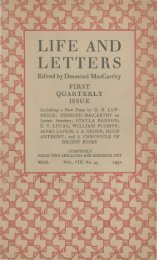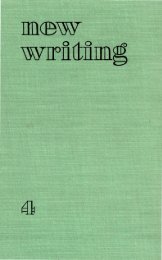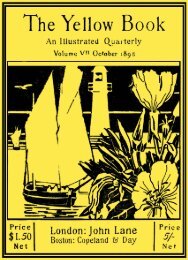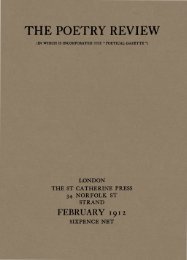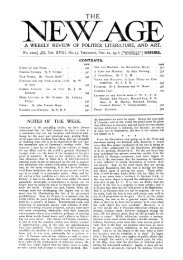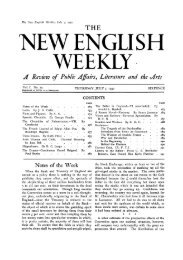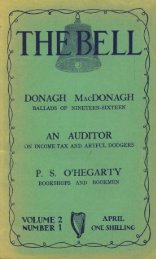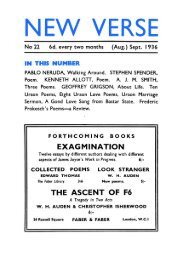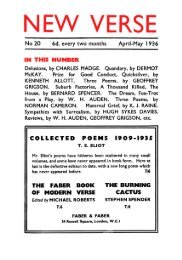Vol. VI No. 1 - Modernist Magazines Project
Vol. VI No. 1 - Modernist Magazines Project
Vol. VI No. 1 - Modernist Magazines Project
You also want an ePaper? Increase the reach of your titles
YUMPU automatically turns print PDFs into web optimized ePapers that Google loves.
LETTERS FROM ABROAD<br />
cheap, they are still too dear nowadays for the class for which they are<br />
intended.<br />
Because our nerves are not harassed enough these days, the "Grand<br />
Guignol" has paid us its first visit—their speciality of hair-raising horrors<br />
seemed to be unknown here and on some evenings the audience simply fled<br />
from their seats or protested loudly, so that the actors could scarcely continue.<br />
Their humorous repertoire being so delightful, they were begged to make<br />
more copious use of this part of their art, or at least give less harrowing<br />
pieces; they made a compromise but these latter are scarcely less ghastly,<br />
though they were cleverly played.<br />
As a welcome contrast, Barrie's "Was jede Frau weiss" ("What every<br />
woman knows") has been taken into the repertoire of the Staats Theatre and<br />
much appreciated. Here General-Intendant Jessner has produced a revival<br />
of Goethe s "Egmont" and is arranging a Studio, in which, on Sundays, matinee<br />
problem-plays of unknown authors are to be given. The talented poet and<br />
dramatist 'Klabund," whose early death was much lamented here (and<br />
whose Chinese play "Der Kreidekreis" is to be produced in London under the<br />
title "The Chalk Circle" in the late autumn) had a posthumous premiere at the<br />
"Tribune," a kind of commemoration. The play "X.Y.Z." of three persons<br />
is highly amusing and successful with an unexpected ending and is a great<br />
success.<br />
Another of the younger school, Hasenclever, has a tragi-comedy at the<br />
Kammerspiele, "Ehen werden in Himmel geschlossen" ("Marriages are made<br />
in Heaven") which is very original, and, in parts, delicious. I fear, however,<br />
it would shock some English audiences, "der Hebe Gott" in person appearing<br />
on the stage, but as he is made up exactly, in garb and head, as Gerhart<br />
Hauptmann, much amusenfent is caused in the theatre when he enters from<br />
a game of golf on the meadows of Heaven, where two scenes of the play are<br />
laid. He takes coffee with St. Magdalen, to whom St. Peter (played by<br />
Roirianowky, made up as the late Emperor Franz Joseph, with a delightful<br />
Vienna accent and a golden key sticking out of his coat pocket) is paying a<br />
visit. She begs that three suicides (just arrived) may be given another chance<br />
on the earth. This granted, they are sent back, where, of course, they do away<br />
with themselves again. Given another chance and their lives being laid in<br />
humbler places, they muddle up their existences in exactly the same way.<br />
"Der liebe Gott," played by Werner Krauss, is a very lovable figure. He<br />
stands helpless at the end; human beings are not to be saved, they just go<br />
headlong to their own destruction.<br />
Shaw's "Misalliance," here entitled "Eltern und Kinder" ("Parents and<br />
Children"), is having a splendid run at the Komodie. The brilliant dialogue<br />
shows no trace of age. In honour of Tolstoi's centenary, two theatres are<br />
giving "Der lebende Leichnam" ("The living corpse"), each excellent in its<br />
way. Dreiser's "Ton in des Topfer's Hand" ("Clay in the potter's hand")<br />
is clever and well acted, but extremely unpleasant in its subject; Verneuil's<br />
"Herr Lamberthier" (although a French play, it has had its first appearance<br />
here at the Lessing theatre) has two parts only; played by Albert Bassermann<br />
109


